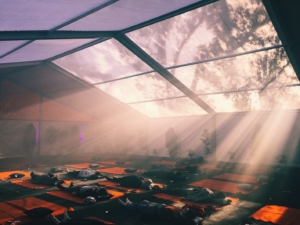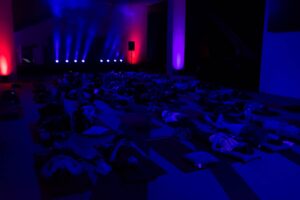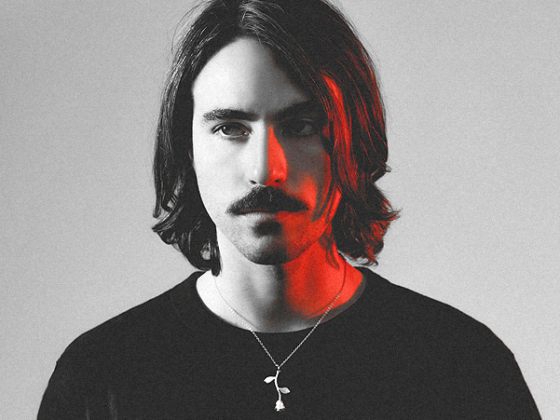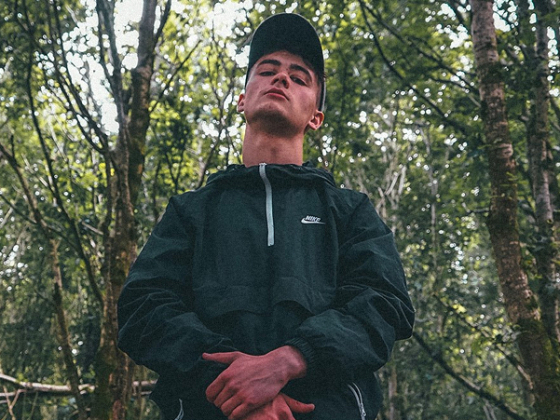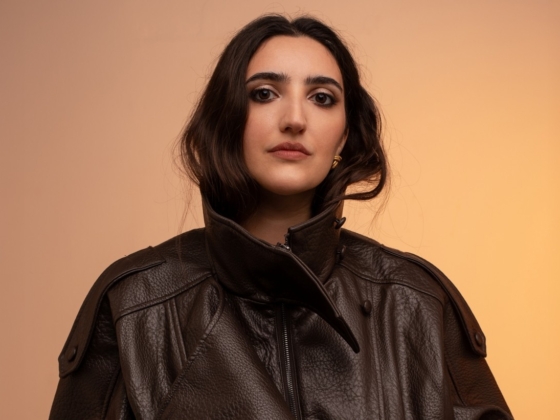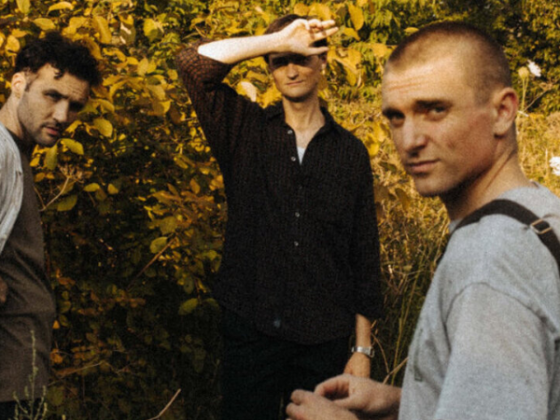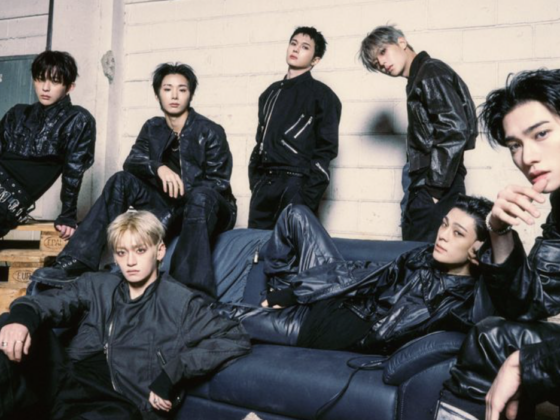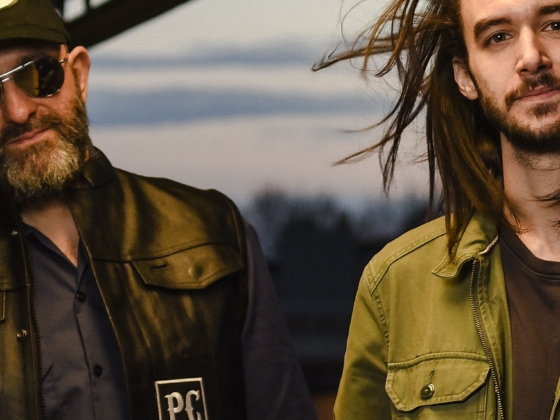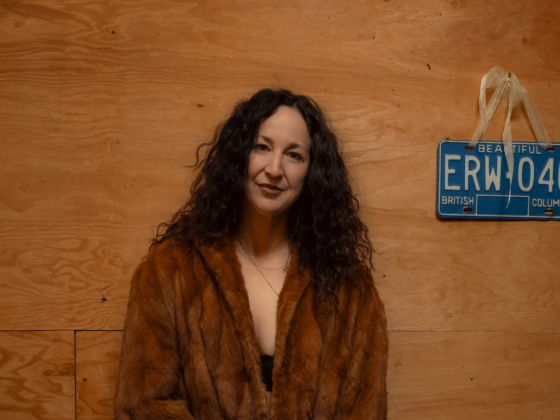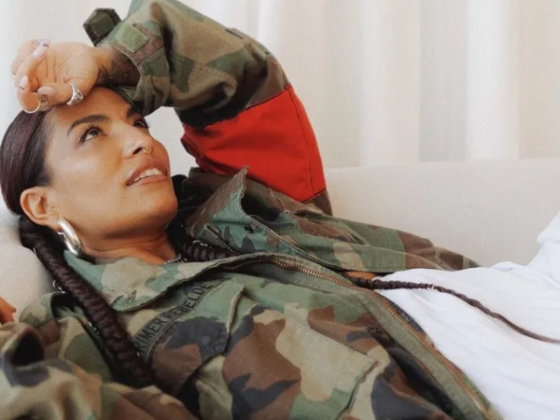When he's not making moody, experimental, left-of-center pop tracks, Lucano is running his initiative, The Indigo Project AU, a foundational program at the intersection of progressive psychology and modern musical approaches. Their most well-known experience is called Listen Up – a contemporary sound bath that some people like to call “ambient church.” The evidence and trend towards "sound baths", with startups like Tune Studio, and headlines that read 'This New Music App Wants To Help You Manage Your Mental Health', show that there's global interest towards the synergy, and with musicians themselves partnering up with forward-facing mental health companies, we hope it will keep spreading widely.
"Music is more accessible than ever before, but we're dedicating less and less time to it exclusively," says Lucano. He and founder Mary Hoang started their sessions to provide a focused listening environment, as well as to tailor the practice of mindfulness to audiences who might consider it a sort of chore. The first two sessions, which both sold out, centered on Chilean electronic producer Nicolas Jaar's 2016 album Sirens and German composer Frahm's eclectic live album Spaces.
We dive in further with Lucano into the Indigo Project, the connection between music and mental health, as well as his beautifully curated 30-track playlist to accompany us on our own personal healing journeys right at home, featuring music from Mark Prichard, Thom Yorke, Nick Cave and more, all below.
The playlist and interview come following his latest release "Fangtooth," the second in a series of six singles continues the dizzying sounds that have seen him support Jon Hopkins, Kiasmos and Machinedrum amongst others, ‘Fangtooth’ will be followed up by a soon-to-be-announced tour and installation work at Melbourne Music Week. Both tracks will be featured on Phondupe’s forthcoming debut album ONYKIA on his very own Air Con imprint.
Get to know Phondupe below, expand your traditional ways of thinking about music and be prepared to journey along with this wonderfully curated playlist.
MEND by Phondupe
A collection of songs for hiding, breaking and rebuilding.
EARMILK: How do you see the connection between music & mental health?
Rich Lucano: Music has been used as healing for thousands of years. I think we still look to music to help us with our minds and moods, but often without realizing it. We want escapism so we go to concerts, we need transformative experiences so we go to festivals…
Music can play a powerful role in regulating our attention, behavior and mood, helping us focus, train harder and relax… so when we curate music for different moments of our lives, we’re kind of being our own music therapists.
EM: Can you share a bit about your path with The Indigo Project*?
RL: The Indigo Project is an innovative mental health organization that was founded by my partner Mary Hoang, the head psychologist. It’s a place that presents therapy, courses, workshops, and experiences – centered around exploring and improving your mind.
I came on board when we expanded into a three-level mental health hub, overseeing any music-related activity, from writing original music for our immersive experiences to programming music for our courses and workshops.
Honestly, I don’t think there’s anywhere else like Indigo; therapy, workshops and immersive experiences all under one roof. Typically mental health approaches can be a little stale. We’re all about framing things in a way that’s real, accessible and creative – music plays a big part in that.
EM: What can we expect at an Indigo immersive experience?
RL: Our most popular experience is called Listen Up – it’s a contemporary sound bath that some people like to call “ambient church”. Every month we get sixty people lying in the dark, in a ceremonial-type experience, listening to an album or “sound journey”, typically in the ambient /soundtrack/experimental/ post-rock genres. It’s weird how rare that opportunity is – to switch off everything and just connect with sound.
When was the last time you listened to music, without doing anything else? That question was the nucleus for Listen Up, but it transformed into this cathartic cocoon for people that’s developed a real community. I was like an ambient DJ for the first couple of years and then we said to ourselves – “What if I wrote and performed the music myself?”
So I did… And Death Meditation was born.
EM: Can you tell us about Death Meditation?
RL: Death Meditation is an embodied experience of death. Again, participants lie down, close their eyes and are taken through a simulation of their death, and the death of someone they love – to a live soundtrack. I know how morbid that sounds, but stay with me… We presented it at the We’re All Going To Die Festival and found that the simulation of death genuinely motivates people into taking action in their lives.
By the end, people are calling friends they haven’t spoken to in years, writing to family, making up with people they’ve been fighting with. It’s not an easy process to go through, but it’s the most significant thing I’ve ever been a part of. I can’t think of another environment where I'd witness that many people crying in front of me while performing.
EM: How does mental wellbeing play a role in your own creation of music?
RL: I think for any artist, the challenge is to get out of your own way. I’ve spent a lot of time between releases arguing with myself about what’s “good enough” and I’m in a constant battle with my mind around the stuff that I make – it’s important to manage that.
What changed for me was understanding the importance of self-awareness. Before I had any awareness of my thoughts, my default when creating anything was “this is shit” and “everyone’s going to hate it”. I’d make something and immediately judge it.
The biggest challenge has been reeling in those thoughts and I’ve got to hand it to meditation for helping me do that. By becoming more aware you can call out that little voice in your head when it’s being an asshole, and give yourself more room to breathe – and create.
EM: How would someone fully integrate music into a part of their wellness toolkit?
RL: If you’re not using music to help manage your mind, you’re selling yourself short. You have practically every song ever made, more or less for free, at your fingertips and the result is that we’ve become our own music medicine doctors, self-administering shots as needed.
The trick is to understand what to listen to and when. Take some time to develop your own banks of playlists & albums under different emotional categories so they’re there when you need them.
Take five minutes to listen to one song in full every morning (without doing anything else) to ground yourself – that in itself is a meditation. Weekly, take the time out to listen to an album start to finish – it can help regulate your moods if you listen to something emotionally complex or challenging. For me, the more instrumental, the better, as it gives you space to become aware of where you’re at.
Some albums that are great for this… Fordlandia by Johan Johannsson, All Melody by Nils Frahm, Finding Shore by Tom Rogerson & Brian Eno, Under The Sun by Mark Pritchard.
EM: Is there a connection between sound and music that is scientifically proven for helping with one's own mental state?
RL: The amygdala is known as the fear center of the brain. When we’re stressed out, more blood is pumped to the amygdala and it swells. Research has found that when we listen to pleasing music, the opposite happens – it decreases in size. You can calm your fears and anxieties, through music. “Pleasing” is a subjective term though, so Slayer may not help your mother chill.
For the last three years, we’ve been running an in-depth research study with Dr. Amanda Krause from the University of Melbourne around our Listen Up sessions. The data is telling us that people are finding the process of sitting through difficult, sad music, incredibly cathartic – it actually makes them feel better. This reflects research in emodiversity – the concept that feeling more varied emotions is better for mental health.
EM: If there's one piece of advice you'd share for maintaining a healthy mental state what would it be?
RL: My advice is to let yourself break when you need to. I resisted that for so long – I had to be in control all the time, and that’s a slippery slope. In the last few years, I’ve lost one of my best friends to cancer and another to suicide. The one thing that helped me most was taking myself away from everything and sitting with some pretty dark records, listening to them start to finish and letting all the emotion out.
As a society, we’re way too focused on being happy all the time. It’s important to just feel shit sometimes and music can help you sit with that.
EM: Can you share a bit about the large live installation you’ve been working on at this time?
RL: I presented a performance installation called ABYSSAL +31 at Melbourne Music Week exploring anxiety and consciousness.
I brought on this incredible eight-piece Italian seniors choir to perform my track Abyssal -4400 on the steps of a building from the mid-1800’s. The track samples an ancient Calabrian fishing chant, which was sung on loop – “U Leva Leva” / “Lift, Lift”. The public was asked to haul a two-tonne cube by rope, down the main street of Melbourne as they considered the things weighing them down in life.
For each haul, there was a journey of discovery for participants as they slowly realized that the cube would not move with any less than four people, all pulling in time with the chant.
EM: Anything else you'd like to share?
RL: I’ve actually just finished creating 17 new original minimal ambient tracks that now form the basis of the meditations used at The Indigo Project, in sessions and courses. For now, they’re only available via Indigo’s new Get Your Shit Together online course, but they’ll get a standalone release next year.
——


